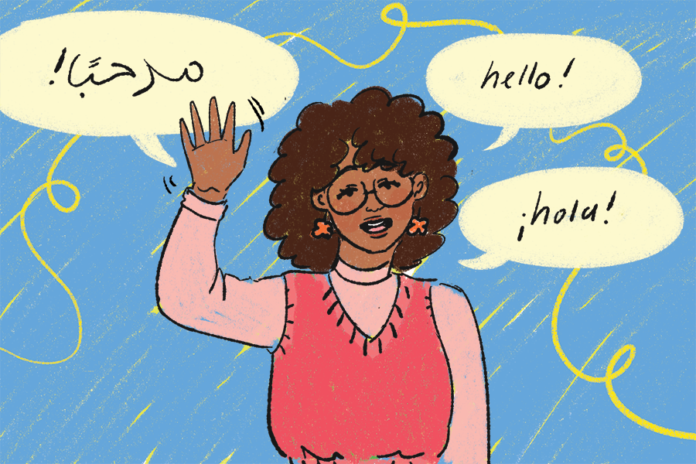Multilingual professors and students share their experiences with learning multiple languages
By FAITH DEMEULENAERE — features@theaggie.org
In a world where communication is key, the significance of being multilingual cannot be overstated. Embarking on a linguistic exploration within the vibrant realm of bilingualism unravels the myriad of benefits through the perspectives of a distinguished linguistics professor, a passionate volunteer at a Spanish immersion school and a hard-working college student who became proficient in the language outside of the education system.
Julia Menard-Warwick, a linguistics professor at UC Davis and second language acquisition researcher, has quite a bit of experience and insight on the ups and downs of language learning. Knowledgeable in Spanish, French, Arabic, Japanese and Russian, Menard-Warwick has plenty of relative knowledge and insights that could show a potential language learner what that process entails.
Menard-Warwick’s research consists of second language learning and teaching, emphasizing the topic of identities and ideologies. She’s done research on both English and Spanish as a second language, more specifically on how learning a second language affects people’s lives.
“This society considers monolingualism to be normative,” Menard-Warwick said. “You can learn a language and not expand your worldview at all, [just] learn the grammar and the vocabulary. That’s what some people like to do. But I mean, as far as I’m concerned, that’s pointless. If you’re going to learn a language, it’s to speak to people who speak that language, and of course it’s for a better worldview. You are expanding your cultural expectations for all human life.”
When it comes to academics and jobs, Menard-Warwick discussed the importance of respecting another’s culture through language.
“You can always make [non-English speaking peers] learn English,” Menard-Warwick said. “But then you are always speaking your language and never speaking theirs. You can have much more awareness of who they are and where they are coming from if you even try to speak their language. It’s a sign of respect, to show the want to see their perspectives on things.”
On the other hand, Menard-Warwick explained the value of bilingualism, or potentially lack thereof, in the workforce.
“Unfortunately, very often bilingualism is valued at the surface, but I don’t believe it’s something that will get you paid more,” Menard-Warwick said. “It might get you the job, but it wouldn’t necessarily get you a promotion.”
Lily Vanhoy, a fourth-year linguistics major with a Spanish minor, shared her personal journey.
“Even though I come from a monolingual family, I am extremely grateful for the opportunity to have been placed in a Spanish immersion program as it has completely changed my life for the better. My passion for language and culture began at the very same elementary school I now volunteer at and one day hope to work at as a speech and language pathologist.”
Vanhoy highlighted the impact that speaking numerous languages has on one’s perception of the world and their participation in it.
“Being bilingual or multilingual allows someone to become more of an active participant in our multicultural and lingual world,” Vanhoy said. “Being multilingual can definitely expand one’s world view, as by learning another language you become immersed in more than only one cultural community.”
Samuel Baron, a third-year political science major, learned Spanish through secondary education practices.
“I feel as though second language acquisition is definitely not emphasized in American education and culture as it is in other countries,” Baron said. “Because English is globally recognized as a prominent second language to other countries, it kind of feels like we have a privilege of knowing it fluently from the get-go and don’t feel the pressure to conform to other cultures.”
Baron expanded on the restrictions of learning a language within the educational system.
“Even though we technically learn second languages in schooling, most students don’t take it seriously,” Baron said. “If it wasn’t for the other opportunities I took to immerse myself in Spanish outside of school, I wouldn’t be nearly as successful as I am with the language today.”
Overall, with a wide variety of opinions on second language acquisition and its importance, most would agree that monolingual English society shortens our horizons and views on other cultures. Language learning is not only a skill but a tool for broadening one’s worldview.
Written by: Faith DeMeulenaere — features@theaggie.org










